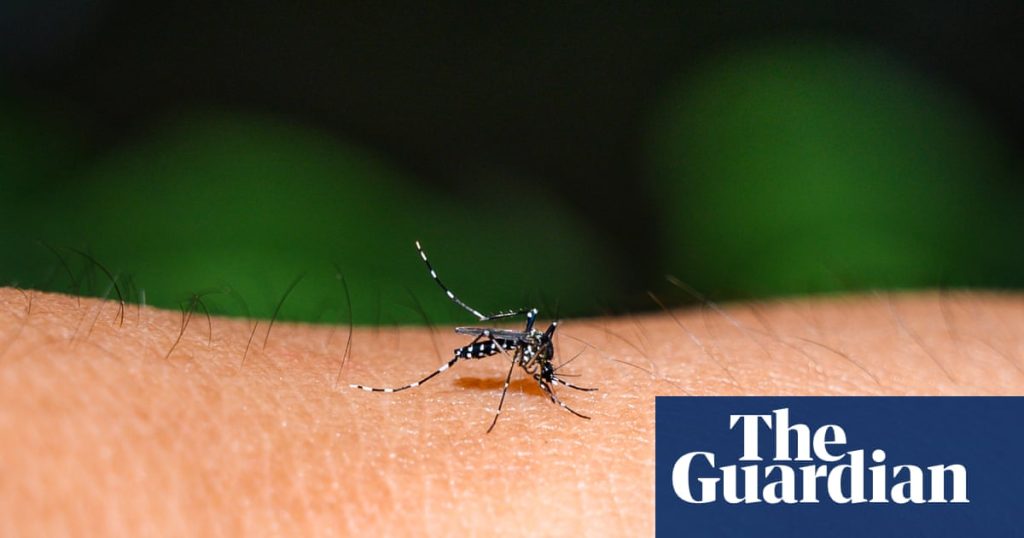The climate crisis is driving a sharp rise in dengue fever cases across the Pacific islands, experts say, as infections hit their highest level in a decade and several countries declare emergencies.
Pacific Island countries and territories have reported 16,502 confirmed cases and 17 deaths since the start of 2025, according to the Pacific Syndromic Surveillance System (PSSS), which collaborates with the World Health Organization (WHO) and other agencies. Infections across the region are at the highest level since 2016, the WHO said. Fiji, Samoa and Tonga are among the worst affected.
Dr Paula Vivili, deputy director general of the Pacific Community (SPC), said historically dengue outbreaks were seasonal.
“However, due to climate change, transmission seasons are lengthening, and some areas are experiencing year-round dengue risk,” Vivili said.
Dengue fever, a viral illness spread by Aedes mosquitoes, causes high fever, severe headache, joint and muscle pain, rash, and in severe cases can be fatal. Rising temperatures, rainfall and increased humidity are creating ideal breeding conditions for Aedes mosquitoes, even in areas previously unsuitable for transmission.
“Dengue is one of the first real disease-related phenomena that we can lay at the foot of climate change,” said Dr Joel Kaufman, epidemiologist and director of the Center for Exposures, Diseases, Genomics and Environment at the University of Washington.
“Rainfall raises the waterline over mosquito eggs laid just above the surface, which then hatch – that’s part of the natural breeding cycle. Heavy rains can also increase stagnant water sources, creating more opportunities for mosquitoes to breed,” he said.
Kaufman warned these outbreaks pointed to a wider public health challenge.
“It is in the vanguard of what will certainly be many types of human disease that become more common and more serious as the planet warms.”
Since declaring an outbreak in April, Samoa has confirmed six dengue-related deaths, including two siblings, and more than 5,600 cases. This year Fiji has recorded eight deaths and 10,969 cases. Tonga has reported over 800 cases and three deaths since declaring an outbreak in February.
These outbreaks underscore the region’s vulnerability to climate-sensitive diseases, which are expected to intensify as global temperatures rise.
Pacific Island countries produce just 0.03% of global greenhouse gas emissions, according to the Intergovernmental Panel on Climate Change (IPCC), but face some of the most severe climate-related health threats, including vector-borne diseases.
Recent months have brought extreme rainfall to parts of the Pacific including Palau, Papua New Guinea and Solomon Islands, while severe drought has gripped parts of the Marshall Islands, Papua New Guinea, Nauru and Fiji, according to the New Zealand National Institute of Water and Atmospheric Research (NIWA). Forecasts show these contrasts will continue into October.
Although higher rainfall has been attributed to ideal conditions for mosquito breeding, Kaufman said that extreme weather events can also increase transmission of mosquito-borne diseases. Seriously dry or very dry conditions were recorded across large parts of the Pacific in the first half of the year, according to NIWA.
“We might have thought the dryness would reduce mosquito-borne infections, but it seems that’s not what happens,” Kaufman said. “Instead, there’s an acceleration of transmission.”
Across the Pacific, national responses have varied. Samoa, Cook Islands and American Samoa have declared emergencies. The Cook Islands has conducted island-wide clean-ups, intensified surveillance and targeted spraying. Tonga has worked with the WHO to bolster its outbreak response in its worst-hit islands, while Tuvalu has turned to social media and health campaigns to promote preventive measures. Samoa has held school clean-ups and boosted public health messaging. New Zealand has sent a clinical team and NZ$300,000 ($178,000) worth of medical supplies to Samoa, alongside on-the-ground personnel and ongoing coordination with Samoan health officials.
But experts say these measures are being undermined by inadequate surveillance.
“Current disease surveillance systems are rarely sufficient to manage dengue, as evidenced by the continual growth of dengue in the region, and more generally globally,” said Dr Bobby Reiner, disease ecologist at the Institute for Health Metrics and Evaluation at the University of Washington.
Mosquito control tools are methods used to reduce the population of Aedes mosquitoes that spread dengue, such as removing breeding sites, applying larvicides or spraying insecticides. They can also include biological controls, personal protection measures and community clean-up campaigns to prevent mosquito bites and transmission.
Still, Reiner said many mosquito control tools had never been proven to reduce transmission, with most responses reactive and often “wastefully chasing the outbreak, applying effort too late”.

